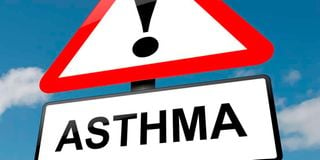These foods will trigger your asthma attacks

Wash your hands and surfaces well after cooking or eating to avoid cross-contamination.
What you need to know:
- If you think you may have asthma or experience symptoms after eating certain foods, see a doctor for proper diagnosis and treatment.
- With the help of a medical professional, you can develop a plan to manage your asthma and avoid triggers that could lead to an asthma attack.
- Read food labels carefully and always inform your waiter or waitress about your allergies when dining out.
One of the most frequent questions that asthma patients ask is whether any specific foods can trigger an attack. Unfortunately, the answer is yes. Various foods have been known to cause asthma symptoms in some people.
Asthma is a respiratory condition that affects the airways, making it difficult to breathe. It is caused by inflammation in the airways, which makes them swell and narrow. This can make it difficult to move air in and out of the lungs, leading to shortness of breath, wheezing, and chest tightness.
Asthma can increase the risk of anaphylaxis, a severe and sometimes deadly allergic response. Anaphylaxis can occur within minutes of exposure to an allergen and can cause death if not treated immediately.
The following can cause asthma attacks.
- Respiratory infections such as influenza
- Allergens such as pollen, dust mites, animal dander, and mold
- Strenuous exercise
- Chilly air
- Air pollution
- Cigarette smoke
- Strong emotions such as laughter, yelling, crying, or anger
- Certain medications such as beta-blockers and aspirin
- Foods that contain sulphites such as dried fruit, beer, and wine
Additionally, there are foods that, when consumed, can cause airways to constrict, making it difficult to breathe.
These foods may not cause an asthma attack in everyone who has asthma, but they are more likely to trigger symptoms in people who have.
Eggs
Eggs can cause a severe reaction in some people. Symptoms of an egg allergy include hives, sneezing, wheezing, coughing, trouble breathing, and vomiting.
For asthmatic people, it may trigger an asthma attack.
If you have an egg allergy, avoid foods that contain eggs. This includes omelettes and scrambled eggs and processed foods that contain egg ingredients. Always read food labels carefully.
Wheat
The gluten in wheat can trigger an asthma attack in some people. Gluten is a protein found in wheat, rye, and barley. In people with asthma, consuming gluten may trigger an inflammatory response, leading to difficulty breathing and wheezing.
Food additives and preservatives
Food additives and preservatives have been known to cause asthma attacks in some people. For example, sulphites are a common additive that can trigger an asthma attack. Sulphites are found in dried fruits, wine, and some processed foods.
Symptoms of a sulphite allergy can include hives, dizziness, trouble breathing, and itchiness.
Always read food labels carefully.
Shrimp
Shrimp is a common allergen that can cause a severe reaction in some people. Symptoms of a shrimp allergy can include wheezing, nasal congestion, hives, swelling of lips, tongue, or throat, and trouble breathing.
Other shellfish allergies can trigger an asthma attack.
Peanuts
A peanut allergic reaction is like an asthmatic response. The symptoms include wheezing, an itchy throat, tight throat, swelling, and a runny nose. In addition, peanut allergy can trigger anaphylaxis, just like an asthma attack.
For people with asthma, a peanut allergy can trigger an asthma attack.
If you have a peanut allergy, avoid foods that contain peanuts or peanut products. This includes foods like peanut butter and other processed foods that contain peanut ingredients.
Tips for managing food allergies
- See an allergist to get assessed for food allergies. This will help you identify which foods you need to avoid.
- Read food labels carefully. Be on the lookout for hidden sources of allergens in processed foods.
- Carry an emergency epinephrine injector with you at all times in case you have a severe allergic reaction.
- Wash your hands and surfaces well after cooking or eating to avoid cross-contamination.
- When eating at a restaurant, be sure to inform your waiter or waitress of your food allergies.



